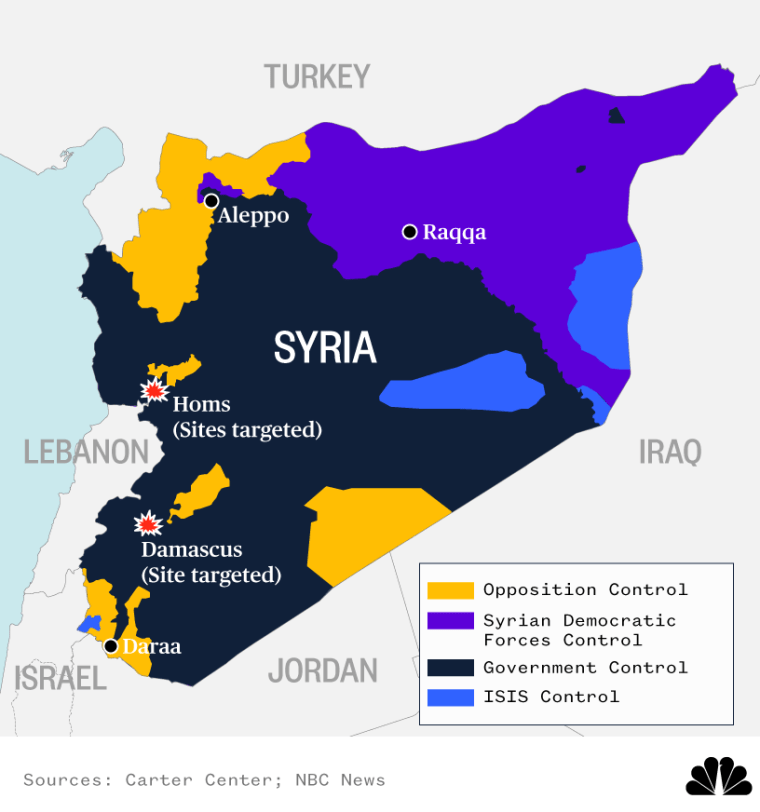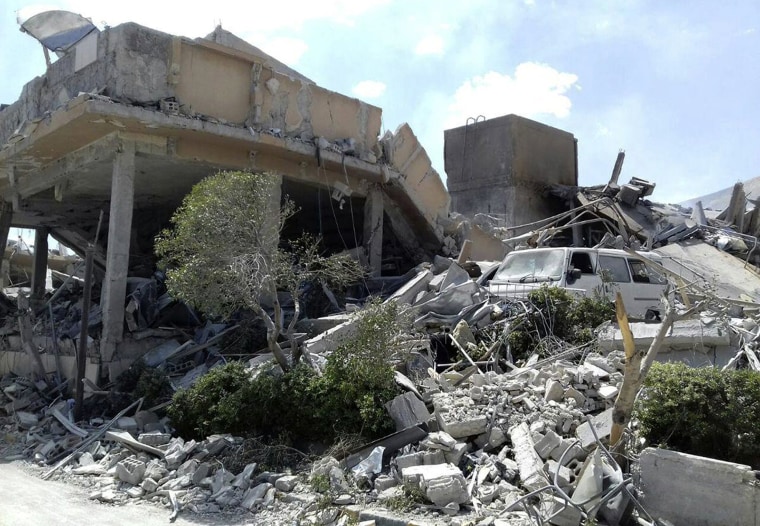President Donald Trump declared "mission accomplished" on Saturday after the U.S.-led predawn airstrikes in Syria dealt what Pentagon officials called a "very serious blow" at "the heart of the Syrian chemical weapons program."
While Syrian television reported that the nation's air defenses had responded to the strikes, "none of our aircraft or missiles in this operation were successfully engaged" by President Bashar al-Assad's regime, said Lt. Gen. Kenneth McKenzie, the director of the Joint Chiefs of Staff.
"The Syrian response was remarkably ineffective," he told reporters Saturday morning.
The airstrikes included 105 weapons that were deployed against three targets in western Syria in a multinational effort that involved France and the United Kingdom and were in response to a suspected chemical attack last weekend that killed dozens near the capital of Damascus.
Pentagon officials said 76 missiles were fired at a Syrian research and development center in greater Damascus, while 22 targeted a storage facility and seven were aimed at a chemical weapons bunker, both west of the city of Homs. The missiles struck at 4 a.m. local time Saturday (9 p.m. ET Friday), according to the Pentagon, rattling residents of Damascus before the city was fully awake.
"The three facilities are — or more appropriately now, were — fundamental components to the regime's chemical weapons infrastructure," McKenzie said. "I'd use three words to describe this operation: precise, overwhelming and effective."
French officials said the country faced a "double complexity" in carrying out operations: There was the more than 4,300-mile distance the French military traveled and then the synchronization required with allies.
There was a "perfect sense of execution," said French Defense Minister Florence Parly.
And yet McKenzie did not rule out the possibility of future chemical weapons attacks by the Assad regime.
"I'm not going to say that they're going to be unable to continue to conduct a chemical attack in the future, but I suspect that they'll think long and hard about it based on the activities of last night," the lieutenant general said.
At a news conference at the Pentagon after Trump announced the operation Friday night, Defense Secretary James Mattis described the strikes as a "one-time shot" and "a little over double the weapons" used by the Trump administration when it carried out a similar assault in April 2017 that consisted of 59 Tomahawk cruise missiles.
"Last year, the focus was on the delivery," Pentagon spokeswoman Dana White said Saturday. "This time, the strikes went to the very heart of the enterprise, to the research, to development, to storage. We are very confident that we have significantly crippled Assad’s ability to deploy these weapons."
She added that while the mission in Syria remains defeating the Islamic State, which has seen its grip weaken in the region in recent months, the U.S. will not allow Assad to attack "innocent Syrian people." The airstrikes, she insisted, also do not represent a change in U.S. policy.

Trump earlier this month had reluctantly agreed to keep U.S. troops in Syria for an undetermined period of time to defeat ISIS.
Syria has been locked in a civil war since the Arab Spring of 2011, pitting rebel groups who seek to depose the Assad regime against Russia-backed government forces.
Both Russia and Iran condemned the airstrikes, with Russian military officials claiming Saturday that the Syrian military had shot down more than 70 missiles.
White stood by Trump's assessment of "mission accomplished."
"Last night, operations were very successful, we met our objectives, we hit the sites — the heart of the chem weapons program — so it was 'mission accomplished,'" White said.
Trump's tweet Saturday appeared to be referring to the success of the strike, but whether or not the Assad regime will be deterred from using chemical weapons remains to be seen.
The president tweeted again early Sunday morning, responding to criticism of his initial use of the phrase "mission accomplished."
Assad's presidential Twitter account Saturday appeared to show him unfazed by the military strikes.
"Good souls will not be humiliated," it tweeted with a video of him appearing to walk calmly, with briefcase in hand, into his palace in Damascus.
Russian President Vladimir Putin on Saturday reaffirmed Russia's view that the purported chemical attack was a fake, criticizing the U.S. and its allies for launching the strike without waiting for inspectors from the Organization for the Prohibition of Chemical Weapons, the international watchdog group, to visit the area.
The organization said later Saturday that its fact-finding team would continue a planned deployment to Syria to help establish the facts around the suspected chemical weapons attack in Douma.
"The Russian disinformation campaign has already begun," White said. "There has been a 2,000 percent increase in Russian trolls in the last 24 hours."


